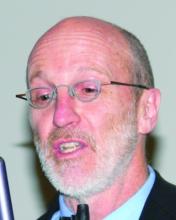CHICAGO - Oncologists can navigate the sensitive and arduous communication of painful news to patients with greater honesty and compassion by expressing wishes in response to their patients’ sense of loss, futility, or unrealistic hope, Dr. Timothy E. Quill, told attendees at the annual Chicago Supportive Oncology Conference.
Communicating with statements such as "I wish there was more we could do for you," "I wish I had better news to give you," "I wish things had turned out better," or "I wish our palliative care was more effective" communicates empathy and caring without distorting the truth, fostering a false sense of hope, or emotionally bludgeoning the patient, said Dr. Quill, director of the center for ethics, humanities, and palliative care at the University of Rochester (N.Y.).
Wishes are effective because they acknowledge the emotional impact of the patient’s illness and allow the physician to respond as a human being to the patient’s emotional distress, while communicating with gentleness and compassion that the hoped-for outcome is unlikely, explained Dr. Quill, a professor of medicine, psychiatry, and medical humanities at the university. Simultaneously – and paradoxically – wishes enable the physician to identify with the patient’s hope while casting that hope in a realistic light.
Dr. Quill stressed, however, that wish statements should be used only as the beginning of an important dialogue. Wishes acknowledge that a desired result probably will not happen, and can elicit anger, hopelessness, terror, and despair. It is essential to talk with patients about their feelings and experiences, he said. The failure to do so could cause emotional harm.
Questions following wish statements – such as "What has been the hardest part for you?" "What are your biggest concerns?" and "How is your family managing this?" – can help to guide meaningful communication. Also critical are statements that validate the patient’s experience ("Anyone going through this would have such feelings") and express empathy ("I can imagine that must have been frightening"), as well as efforts to facilitate opportunities for growth and closure in addressing short-term medical decisions, financial and legal affairs, unfinished personal and family business, and, possibly, spiritual, religious, and existential issues.
He emphasized that this communication must be accompanied by the search for new treatment direction and hope through the appropriate use of standard treatment options, experimental treatment, palliative care, or hospice care.
In responding to an expression of loss, grief, and hopelessness ("I do not see how I can go on"), Dr. Quill noted that the clinician does not have to have all the answers. A statement such as "I wish I had a simple formula" allows the physician to take the same emotional stance as the patient, whereas expressions of empathy ("Tell me about the scariest part," "We can work on this together") can help patients deal with intense emotions, such as fear of abandonment.
In responding to a patient’s expression of unrealistic hope ("I want to live to see the birth of my grandchild"), Dr. Quill suggested that responding with a wish ("I wish I could promise that") and statements of empathy ("It must be hard to contemplate missing that; in case you cannot, perhaps you could ...") can provide support without creating unrealistic expectations.
Dr. Quill had no disclosures. The conference was sponsored by Elsevier Oncology, a company that is affiliated with this news organization.


